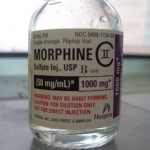 At one point, experts felt certain that they had conquered heroin addiction in the United States. Community providers had performed a significant amount of education and outreach, helping people to understand just how dangerous opiates like heroin could be, and movies like Trainspotting and television shows like The Wire demonstrated how devastating an addiction problem could be to the health of a community.
At one point, experts felt certain that they had conquered heroin addiction in the United States. Community providers had performed a significant amount of education and outreach, helping people to understand just how dangerous opiates like heroin could be, and movies like Trainspotting and television shows like The Wire demonstrated how devastating an addiction problem could be to the health of a community.
Now, there’s some evidence that opiate addictions are returning. Prescription painkillers like Vicodin and OxyContin work on the same portions of the brain that are stimulated by heroin, and as these prescription drugs become harder and harder to buy, users are returning to heroin, and many of them are dying. In Cape Cod, for example, news reports suggest that the heroin overdose rate is skyrocketing, as 13 such overdoses took place between January 1 and February 22 of 2014.
People abuse opioids like heroin and prescription painkillers because they fill the brain with signals of pleasure, and opioids are remarkably addictive, as the pleasure the drugs can bring do long-term damage to cells, and that damage sparks continued use of drugs. It’s a serious problem, but opiate rehab can help.
What to Expect in Opiate Rehab
Opiate addiction recovery programs begin with detoxification. This medically supervised process ensures that people get sober in a safe, controlled environment, so they won’t fall ill as their bodies adjust to the lack of opiates, and so they won’t be in so much pain that they’re tempted to return to drug use and abuse. As experts writing for Harvard Health point out, detox isn’t considered a cure for addiction, as people who go through simple detox tend to return to drugs unless they’re given additional help. But detox is a vital and necessary part of getting well.
Once detox is complete, people with opiate addictions are provided with a significant amount of therapy, including:
- Cognitive behavioral therapy
- Relapse prevention counseling
- Family therapy
- Skill-building therapy
Some are even given extinction therapy, which allows them to examine the triggers that spark cravings for heroin and learn new ways in which to deal with those triggers. In a study of the issue in the journal Addiction, researchers suggest that this form of therapy can help to eliminate condition-specific cravings in as little as three weeks. Clearly, therapy has a huge role to play in helping people to recover.
But in addition to therapy, people might also be asked to spend time in support groups, meeting other people with heroin addictions. These support group meetings allow for peer-to-peer learning, and that can be vital in the early stages of recovery, but people with opiate addictions can also take advantage of these meetings in the years that follow the completion of a formal rehab program. Learning how to participate in a meeting like this now could help them to understand what they’ll need to do when they’re attempting to sustain their recovery down the line.
In addition to support group work and formal therapy, people with opiate addictions might also need to access community resources that can help them to find jobs, resolve legal issues and otherwise put their lives back together. Addictions can be insidious, and they can touch almost every part of a person’s life. In-depth programs might help clients to really amend their lives and deal with their day-to-day challenges, so they’ll be less tempted to self-medicate with drugs. These therapies can seem a little intrusive, but they really can be helpful.
Related Content
Making Good Opiate Rehab Decisions
Opiates like heroin have been in use for decades, and as a result, almost every single rehab facility in the country has some experience in dealing with this type of addiction. Unlike addictions to newer drugs, which might require innovative therapies that only a few facilities provide, heroin recovery is fairly straightforward, and most facility administrators know just what to do to help.
But the quality of the people who run the facility can vary dramatically, as can the results. For example, in a study in the Journal of Nervous and Mental Disease, researchers compared the success rate of multiple counselors and found that one was able to lower medication therapies given to clients while increasing their functional health. The other upped medication doses and had worse responses. Clearly, it’s the expertise of a therapist that can make the difference for some clients.
Interviewing the people who might provide care can help, as might ensuring that the facility has a number of mental health experts who can chip in to tackle a problem. That way, if one provider doesn’t give the right kind of assistance, another could step right in to help.
Clients don’t live on site, so they’re not leaning on the facility to cover every need. That can keep costs down. But outpatient facilities might also provide numerous opportunities for clients to slip out and take heroin. Sometimes, the added expense of inpatient facilities is well worth it, as it might keep some people safer.
Whether you’re just starting your search for a heroin rehab or you’re well on your way to understanding just what your family needs in order to heal, we hope you’ll consider Axis. Our luxury, inpatient facility provides a number of innovative therapies for opiate addiction, and our staff is intensely qualified. We hope you’ll call us to find out more.
It might also be vital to consider the setting and the cost of the program. Outpatient settings, for example, often come with a smaller price tag, as clients are expected to cover their own costs for:
- Housing
- Laundry
- Food
- Recreation








